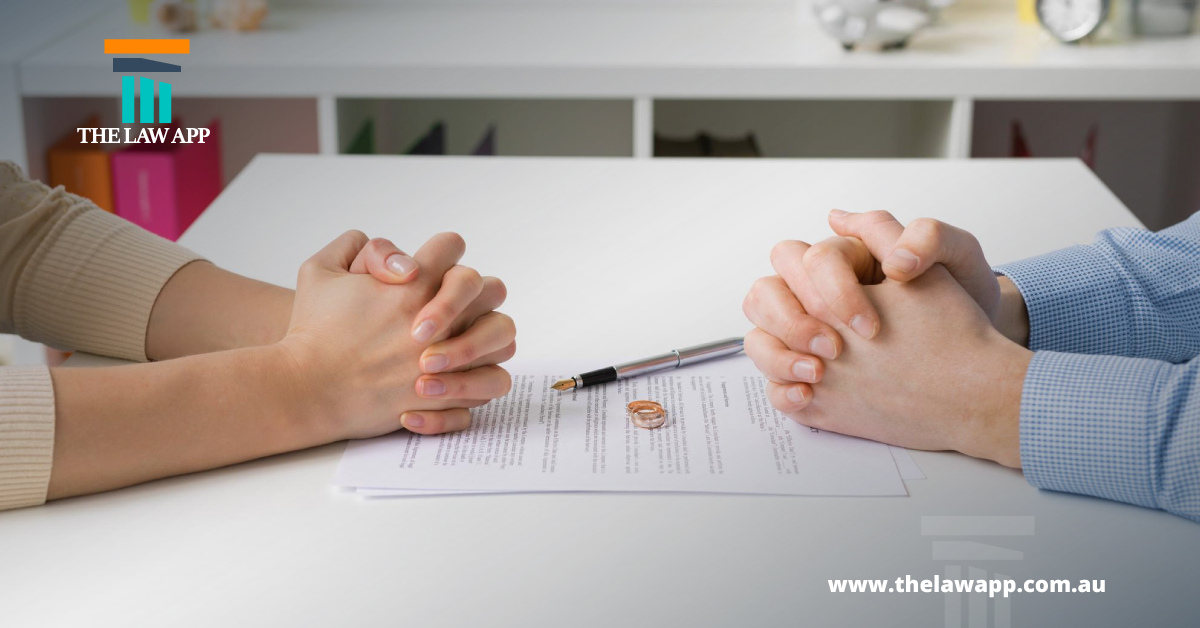Divorce is a challenging journey, and for many couples in Queensland, the thought of navigating through the legalities can be overwhelming. That’s where the concept of “DIY divorce” comes into play, offering an alternative path for those seeking a more hands-on approach to ending their marriage. In this blog post, we will explore the ins and outs of DIY divorce in Qld, shedding light on its significance and the advantages it brings.
Why DIY Divorce in Queensland?
 DIY divorce, short for “Do It Yourself,” refers to the process where couples take charge of their divorce proceedings without extensive reliance on legal representation. It may sound daunting at first, but there are compelling reasons why some couples opt for this route.
DIY divorce, short for “Do It Yourself,” refers to the process where couples take charge of their divorce proceedings without extensive reliance on legal representation. It may sound daunting at first, but there are compelling reasons why some couples opt for this route.
- Cost-Efficiency: One of the primary motivations for choosing a DIY divorce is cost savings. Legal fees can quickly add up, making divorce an expensive undertaking. By handling the process themselves, couples can allocate their resources more effectively.
- Empowerment and Control: DIY divorce empowers couples to have more control over their divorce proceedings. They can make decisions that align with their unique circumstances, rather than having a third party dictate terms.
- Privacy and Confidentiality: For some, privacy is paramount. DIY divorce allows couples to keep their personal matters out of the public eye, as court hearings are not always necessary when both parties are in agreement.
- Flexibility: DIY divorce qld offers a more flexible timeline. Couples can proceed at their own pace, reducing stress and allowing for better emotional adjustment.
However, embarking on a DIY divorce journey in Queensland is not without its complexities and potential pitfalls. It’s crucial to understand the legal requirements, seek expert advice when necessary, and be well-prepared for the road ahead. In the following sections, we will delve into the expert tips and guidance that can make your DIY divorce Qld a smoother and more manageable process.
Understanding QLD Divorce Laws
When embarking on the journey of divorce in Queensland, it’s crucial to have a solid grasp of the state’s divorce laws. Understanding these legal requirements is the first step toward a successful DIY divorce qld. In this section, we’ll delve into the key aspects of Queensland divorce laws, including recent changes and valuable resources for further information.
Key Legal Requirements:
Queensland follows Australia’s uniform family law system when it comes to divorce. Some essential requirements include:
- Separation Period: Before applying for divorce, couples must have been separated and living separately for at least 12 months. This separation period is critical and is often the first hurdle in the divorce process.
- Irretrievable Breakdown: The marriage must have irretrievably broken down, meaning there is no reasonable likelihood of reconciliation between the parties.
- Residency: One of the parties must be an Australian citizen, live in Australia, or regard Australia as their permanent home.
- Child Custody: If there are children under the age of 18, the court needs to be satisfied that proper arrangements are in place for their care, known as parenting arrangements.
Recent Changes in Divorce Laws:
Queensland’s divorce laws have seen relatively few changes in recent years. However, it’s crucial to stay updated with any modifications. In 2019, the Family Law Amendment (Family Violence and Cross-Examination of Parties) Act introduced safeguards to protect victims of family violence during court proceedings. This change has significant implications for divorce cases involving domestic violence.
Official Resources for In-Depth Legal Information:
For those seeking comprehensive information and resources on Queensland divorce laws, the official websites and resources provided by the Australian government can be immensely helpful. Some valuable links include:
These websites offer detailed information, forms, and guides that can assist you in navigating the legal requirements of divorce in Queensland.
Having a solid understanding of these legal prerequisites is fundamental to a successful DIY divorce in Qld. In the following sections, we’ll delve deeper into expert tips and strategies to help you smoothly navigate the process while ensuring compliance with the law.
Financial Preparation
Divorce, beyond its emotional challenges, has profound financial implications. In this section, we’ll delve into the crucial financial aspects of divorce in Queensland, including asset division, spousal support, and the importance of thorough financial preparation.
Asset Division and Spousal Support:
- Asset Division: Queensland follows the principle of “just and equitable” division of assets. This means that assets acquired during the marriage will be distributed fairly, but not necessarily equally. It’s essential to create an inventory of all assets, including property, investments, and debts, to facilitate a smoother division process.
- Spousal Support: Spousal maintenance may be relevant if one party is unable to support themselves financially post-divorce. This can be a complex issue, and expert advice may be necessary to determine whether it applies in your case.
Practical Tips for Organising Financial Documents:
- Gather All Financial Records: Start by collecting all financial documents, including bank statements, tax returns, mortgage documents, and investment statements.
- Create a Comprehensive Budget: Outline your current financial situation, including income, expenses, and debts. This will help you understand your financial needs during and after divorce.
- Open Individual Accounts: Consider opening individual bank accounts to separate your finances from your spouse’s. Redirect any income or payments to these accounts.
- Consult a Financial Advisor: If your financial situation is complex, seeking guidance from a financial advisor or accountant can provide valuable insights.
Significance of a Financial Settlement Agreement:
One of the essential aspects of financial preparation in a divorce is the creation of a financial settlement agreement. This legally binding document outlines how assets, debts, and financial responsibilities will be divided. It helps prevent future disputes and provides clarity on each party’s financial obligations.
A well-crafted financial settlement agreement can save time, money, and emotional stress by avoiding lengthy court battles. It’s advisable to consult with a legal expert to draft this agreement, ensuring it complies with Queensland’s divorce laws.
In the next section, we’ll explore the emotional aspects of divorce and strategies for maintaining your well-being throughout the process. Balancing financial preparation with emotional support is key to a successful DIY divorce Qld.
Emotional Support and Well-being
 Amidst the legal intricacies of divorce, it’s easy to overlook the profound emotional toll it can take. In this section, we’ll underscore the paramount importance of emotional well-being during a divorce and provide guidance on seeking support and self-care strategies to navigate this challenging journey successfully.
Amidst the legal intricacies of divorce, it’s easy to overlook the profound emotional toll it can take. In this section, we’ll underscore the paramount importance of emotional well-being during a divorce and provide guidance on seeking support and self-care strategies to navigate this challenging journey successfully.
The Importance of Emotional Well-being:
A divorce is not just a legal separation; it’s a profound life transition that often brings a rollercoaster of emotions—grief, anger, sadness, and anxiety. Prioritising your emotional well-being is essential for making sound decisions and ensuring a healthier post-divorce life.
Seeking Emotional Support:
- Friends and Family: Reach out to your trusted circle of friends and family. They can provide a listening ear, a shoulder to lean on, and invaluable emotional support.
- Professional Help: Consider counseling or therapy to help you cope with the emotional aspects of divorce. A qualified therapist can provide guidance and strategies to manage your emotions effectively.
- Support Groups: Joining support groups for individuals going through divorce can be incredibly comforting. You can connect with people who understand what you’re going through and gain insights from their experiences.
Self-Care Strategies:
- Prioritise Self-Care: Make self-care a non-negotiable part of your routine. This includes eating well, getting regular exercise, and ensuring you get enough rest.
- Mindfulness and Meditation: Practices like mindfulness and meditation can help calm the mind and reduce stress. Even a few minutes a day can make a significant difference.
- Set Boundaries: Establish clear boundaries with your ex-spouse to minimise conflict and emotional distress. Communication should be focused on essential matters.
- Seek Legal Advice: Knowing your rights and legal options can alleviate anxiety. Consult with a family law attorney who can provide clarity on the legal aspects of your divorce.
- Journaling: Writing down your thoughts and feelings can be therapeutic. It allows you to process emotions and gain a better understanding of your journey.
Remember that healing takes time, and it’s okay to seek help when needed. Emotional well-being isn’t just a bonus; it’s a fundamental pillar of a successful DIY divorce qldd. In the next section, we’ll explore the practical steps involved in the DIY divorce process to help you stay on track during this challenging time.
DIY Divorce Process
Navigating the DIY divorce process in Queensland may seem daunting, but with the right guidance, it can be a manageable and cost-effective way to dissolve your marriage. In this section, we’ll provide a step-by-step guide to help you understand the process, offer tips on correctly filling out divorce applications and forms, and highlight common pitfalls to avoid.
Eligibility Check
Before diving into the DIY divorce process, ensure that you meet the eligibility criteria. You must have been separated for at least 12 months, and one party must be an Australian citizen, live in Australia, or consider Australia their permanent home.
Gather Required Documents
Collect essential documents, including marriage certificates, identification, and financial records. Having these readily available will expedite the process.
Complete the Divorce Application
- Obtain a copy of the divorce application form (Form 3) from the Family Court of Australia’s website.
- Fill out the application accurately, providing details about your marriage, separation, and arrangements for children (if applicable).
- Sign and date the application. Both parties can sign separately or together.
File the Application
Submit your completed divorce application to the Federal Circuit Court of Australia, along with the necessary filing fee. You can do this online or in person.
Serve the Application
Serve a copy of the divorce application on your spouse. This informs them of the divorce proceedings. The court can provide guidance on acceptable methods of service.
Wait for a Response
After serving the application, wait for your spouse’s response. If they agree with the divorce, they can complete and return the acknowledgment of service form. If there’s no response within a specific period, you can proceed with the divorce.
Attend Court (if required)
In some cases, you may need to attend court. If there are disagreements or issues regarding children or property, a court hearing may be necessary. Seek legal advice if you encounter complications.
Common Pitfalls to Avoid:
- Incomplete Forms: Ensure all forms are filled out accurately and completely to prevent delays.
- Not Serving Properly: Improper service can lead to complications. Follow legal guidelines for serving divorce papers.
- Ignoring Legal Advice: While it’s a DIY divorce qld, seeking legal advice when needed is crucial, especially if complex issues arise.
By following these steps and staying vigilant about potential pitfalls, you can successfully navigate the DIY divorce process in Queensland. Remember that legal assistance is available if you encounter difficulties, ensuring your divorce proceeds as smoothly as possible.
Alternative Dispute Resolution
Amid the emotional turmoil of divorce, alternative dispute resolution (ADR) methods offer couples in Queensland an opportunity to resolve their differences amicably and outside of the courtroom. In this section, we’ll introduce ADR methods like mediation and collaboration, explain their benefits, and provide guidance on finding qualified professionals to assist in the process.
Introduction to ADR Methods:
- Mediation: Mediation involves a neutral third party, known as a mediator, who helps couples communicate and negotiate their divorce terms. This method encourages open dialogue and empowers couples to make their decisions.
- Collaborative Divorce: In collaborative divorce, both parties work together with their respective attorneys to reach mutually beneficial agreements. The process is cooperative, with a focus on finding solutions rather than escalating conflicts.
Benefits of ADR:
- Maintaining Control: ADR methods allow couples to retain control over the outcome of their divorce, fostering a sense of empowerment.
- Cost-Efficiency: ADR is often more cost-effective than going to court, as it reduces legal fees and court-related expenses.
- Reduced Emotional Strain: These methods promote constructive communication, which can reduce the emotional stress often associated with divorce litigation.
- Privacy: ADR processes are confidential, keeping personal matters out of the public eye.
Finding Qualified Mediators or Legal Experts:
- Research Local Professionals: Start by researching local mediators or collaborative divorce attorneys. Look for those with experience in family law.
- Check Qualifications: Ensure that the professional you choose has the necessary certifications and training in ADR methods.
- Ask for Recommendations: Seek recommendations from friends, family, or colleagues who may have used ADR services.
- Initial Consultation: Schedule an initial consultation to discuss your case and assess whether you feel comfortable working with the mediator or attorney.
- Check Reviews and References: Read online reviews and ask for references from past clients to gauge the professional’s track record.
Choosing ADR methods can significantly simplify the divorce process in Queensland by promoting cooperation and reducing conflict. These methods are particularly advantageous when children are involved, as they prioritise the best interests of the family. By engaging qualified professionals, you can navigate this alternative path to divorce with confidence and a focus on mutual agreement.
Child Custody and Parenting Plans
 In a DIY divorce qld, addressing child custody and parenting arrangements is paramount, as the well-being of your children should always be the top priority. In this section, we’ll discuss child custody and visitation, offer advice on creating effective parenting plans in accordance with Queensland laws, and provide resources for co-parenting support and guidance.
In a DIY divorce qld, addressing child custody and parenting arrangements is paramount, as the well-being of your children should always be the top priority. In this section, we’ll discuss child custody and visitation, offer advice on creating effective parenting plans in accordance with Queensland laws, and provide resources for co-parenting support and guidance.
Child Custody and Visitation:
Queensland family law emphasises the best interests of the child when determining custody and visitation arrangements. In DIY divorce cases, it’s crucial for parents to work together to create a plan that supports their children’s physical and emotional needs.
Creating Effective Parenting Plans:
- Communication: Open and honest communication between both parents is key. Discuss the children’s needs, routines, and preferences to create a comprehensive plan.
- Consider the Children’s Ages: Custody arrangements should consider the age and developmental stage of each child. What works for a toddler may not be suitable for a teenager.
- Flexibility: Be open to adjusting the plan as circumstances change. Life events such as school schedules, holidays, or job changes may necessitate modifications.
- Legal Compliance: Ensure that your parenting plan complies with Queensland family law. Seek legal advice if you’re uncertain about specific legal requirements.
- Conflict Resolution: Include a conflict resolution process in the plan to address disputes or disagreements amicably, which can prevent conflicts from escalating.
Co-Parenting Support and Advice:
- Family Mediation Services: Consider utilising family mediation services, which can assist in resolving conflicts and reaching agreements when co-parenting becomes challenging.
- Parenting Courses: Attend parenting courses or workshops that focus on effective co-parenting strategies. These programs can provide valuable insights and tools.
- Online Resources: Explore online resources and support groups for co-parents. Websites, forums, and social media groups can connect you with others in similar situations.
- Professional Counseling: Sometimes, it’s beneficial for parents or children to seek professional counseling to help cope with the emotional aspects of divorce and co-parenting.
Remember that the ultimate goal in creating child custody and parenting plans is to provide a stable and nurturing environment for your children during and after divorce. By prioritising their well-being and working together as co-parents, you can help them navigate this challenging transition more smoothly.
Navigating Legal Documents
Navigating the sea of legal documents is an essential aspect of any DIY divorce Qld. In this section, we’ll share insights on understanding these documents, underscore the importance of careful review before signing, and offer a checklist to ensure legal compliance.
Understanding Legal Documents and Contracts:
Legal documents in a divorce can range from divorce applications to property settlement agreements and parenting plans. Understanding these documents is crucial to making informed decisions.
- Read Carefully: Take your time to read every document thoroughly. Pay attention to the fine print, as details matter.
- Legal Jargon: Legal documents can be rife with technical terms and legalese. Don’t hesitate to seek clarification from a legal expert if you don’t understand something.
- Ask Questions: If something seems unclear or ambiguous, don’t hesitate to ask for explanations from your legal advisor or, if you’re handling the divorce entirely on your own, seek help from online legal resources or forums.
Importance of Reviewing Before Signing:
- Avoid Costly Mistakes: Mistakes or misunderstandings in legal documents can be costly to rectify later. Prevention is key.
- Protect Your Rights: Reviewing documents ensures that your rights and interests are adequately protected.
- Compliance: Legal compliance is essential. Ensure that your documents align with Queensland’s family law and divorce regulations.
Checklist for Ensuring Legal Compliance:
- Complete and Accurate Information: Verify that all personal information, dates, and details in the documents are correct.
- Signatures and Dates: Ensure that all parties involved have signed and dated the documents where required.
- Witnesses: If witnesses are necessary, confirm that they have signed in the appropriate places.
- Attachments: Check if any additional documents or exhibits are required, and make sure they are attached.
- Legal Advice: If you’re uncertain about any aspect of the documents, consult with a family law attorney for guidance.
- Filing Procedures: Understand the procedures for filing documents with the court, and ensure that you adhere to the correct timelines and requirements.
- Keep Copies: Always keep copies of all documents for your records.
- Record Keeping: Maintain organised records of all communications and correspondences related to the divorce.
Navigating legal documents can be complex, but attention to detail is crucial. By following this checklist and seeking professional advice when necessary, you can ensure that your DIY divorce Qld proceeds smoothly and in full compliance with the law
Finalising Your DIY Divorce
Congratulations, you’ve reached the final stages of your DIY divorce in Queensland. In this section, we’ll guide you through the last steps of the divorce process, discuss obtaining a divorce certificate, and offer post-divorce advice to help you transition to a new chapter in your life.
Final Steps of the Divorce Process:
- Court Processing: After serving the divorce application and receiving your spouse’s response (if applicable), the court will process your case.
- Court Hearing (if necessary): If there are disputes or issues to resolve, you may need to attend a court hearing. Follow your legal advisor’s guidance if you have one.
- Divorce Order: Once the court is satisfied with the arrangements, they will grant a divorce order. This typically takes about one month from the date of the hearing.
Obtaining a Divorce Certificate:
- Wait for It: After the divorce order is granted, you’ll receive a divorce certificate from the court. This is an official document confirming your divorce.
- Keep It Safe: Store your divorce certificate in a secure place. It’s an important legal document you may need for various purposes in the future.
Post-Divorce Advice:
- Seek Closure: Take time to emotionally process the divorce. It’s natural to have mixed feelings, so seek support from friends, family, or a counselor if needed.
- Financial Review: Reevaluate your financial situation and make necessary adjustments to your budget, investments, and insurance policies.
- Parenting Adjustment: If you have children, ensure that you’re adhering to the parenting plan and maintaining open communication with your ex-spouse regarding your children’s well-being.
- Legal Updates: Update your legal documents, such as wills, trusts, and powers of attorney, to reflect your new circumstances.
- Self-Care: Continue prioritising self-care, exercise, and mindfulness practices to support your mental and emotional well-being.
- New Beginnings: Embrace the opportunity for personal growth and new beginnings. Reconnect with your passions and set new goals for yourself.
Remember, the end of a marriage is also the beginning of a new phase in your life. While the DIY divorce journey can be challenging, it’s a chance for you to shape your future on your terms. With the divorce certificate in hand, you can move forward with confidence and optimism, ready to embrace the possibilities that lie ahead.
In this comprehensive guide to DIY divorce Qld, we’ve covered crucial aspects to help you navigate this challenging journey successfully. Here are the key takeaways:
- Prioritise Emotional Well-being: Divorce is emotionally taxing. Seek support from friends, family, or professionals to help you cope with the emotional aspects.
- Understand Queensland Laws: Familiarise yourself with Queensland’s divorce laws and eligibility criteria before proceeding with a DIY divorce qld.
- Financial Preparedness: Organise your finances, cresate a budget, and consider consulting a financial advisor to ensure financial stability during and after divorce.
- Alternative Dispute Resolution: Explore mediation and collaborative divorce as amicable ways to resolve conflicts and reach agreements outside of court.
- Child Custody and Parenting: When children are involved, prioritise their well-being by creating effective parenting plans that comply with Queensland laws.
- Legal Document Care: Understand legal documents, review them carefully, and ensure compliance to avoid costly mistakes.
- Finalisation and Transition: Follow the final steps of the divorce process, obtain your divorce certificate, and embrace the opportunity for a fresh start in your life.
While DIY divorce can be a viable option, remember that it’s not without challenges. If you encounter complexities or uncertainties, don’t hesitate to seek legal counsel. Your best interests are our priority.
For further resources, explore the Family Court of Australia and Queensland Government websites, where you’ll find extensive information and guidance on DIY divorce qld. We wish you strength, resilience, and a smoother path forward on your divorce journey.
Call to Action (CTA)
 Your insights and experiences are valuable to us. We encourage you to share your own tips and stories in the comments section below. Your contributions can provide support and guidance to others going through similar challenges.
Your insights and experiences are valuable to us. We encourage you to share your own tips and stories in the comments section below. Your contributions can provide support and guidance to others going through similar challenges.
Stay connected with us for the latest updates and resources related to divorce in Queensland. Subscribe to our newsletter to receive exclusive content, expert advice, and helpful tips delivered directly to your inbox.
You can also follow us on social media for real-time updates, community discussions, and a supportive network of individuals who understand the complexities of divorce. We’re here to help you navigate this journey with confidence and resilience. Together, we can make the process a little less daunting and a lot more manageable.
Frequently asked questions (FAQs)
Can I file for a DIY divorce in Queensland if we haven’t been separated for a year yet?
No, you must have been separated for at least 12 months before filing for divorce in Queensland.
Do I need a lawyer for a DIY divorce, or can I handle it on my own?
While it’s possible to handle a DIY divorce without a lawyer, legal advice can be invaluable, especially if your case involves complex issues like property division or child custody.
How long does the DIY divorce process in Queensland typically take?
The process usually takes around 4 to 6 months from the time of filing to the issuance of a divorce certificate, but it can vary based on individual circumstances and court processing times.
What are the court fees for a DIY divorce in Queensland?
As of my last knowledge update in September 2021, the filing fee for a divorce application in Queensland was $930, but fees can change. It’s best to check the current fees on the Federal Circuit Court of Australia’s website.
Do we need to attend court for a DIY divorce in Queensland?
Not always. If both parties agree to the divorce and there are no disputes over property or children, you may not need to attend court. However, if disputes arise, a court appearance may be necessary.
Can we change our parenting plan after it’s been agreed upon in a DIY divorce?
Yes, parenting plans can be changed if both parties agree. However, it’s advisable to formalise any changes legally to ensure they are enforceable.
Is a DIY divorce suitable for all situations, or are there cases where it’s not recommended?
DIY divorce is generally suitable for straightforward cases with no major disputes. It may not be recommended if there are complex financial matters, contentious child custody issues, or concerns about domestic violence. In such cases, seeking legal counsel is advisable.
You might also like to know more about Online Lawyers:

 DIY divorce, short for “Do It Yourself,” refers to the process where couples take charge of their divorce proceedings without extensive reliance on legal representation. It may sound daunting at first, but there are compelling reasons why some couples opt for this route.
DIY divorce, short for “Do It Yourself,” refers to the process where couples take charge of their divorce proceedings without extensive reliance on legal representation. It may sound daunting at first, but there are compelling reasons why some couples opt for this route. Amidst the legal intricacies of divorce, it’s easy to overlook the profound emotional toll it can take. In this section, we’ll underscore the paramount importance of emotional well-being during a divorce and provide guidance on seeking support and self-care strategies to navigate this challenging journey successfully.
Amidst the legal intricacies of divorce, it’s easy to overlook the profound emotional toll it can take. In this section, we’ll underscore the paramount importance of emotional well-being during a divorce and provide guidance on seeking support and self-care strategies to navigate this challenging journey successfully. In a DIY divorce qld, addressing child custody and parenting arrangements is paramount, as the well-being of your children should always be the top priority. In this section, we’ll discuss child custody and visitation, offer advice on creating effective parenting plans in accordance with Queensland laws, and provide resources for co-parenting support and guidance.
In a DIY divorce qld, addressing child custody and parenting arrangements is paramount, as the well-being of your children should always be the top priority. In this section, we’ll discuss child custody and visitation, offer advice on creating effective parenting plans in accordance with Queensland laws, and provide resources for co-parenting support and guidance. Your insights and experiences are valuable to us. We encourage you to share your own tips and stories in the comments section below. Your contributions can provide support and guidance to others going through similar challenges.
Your insights and experiences are valuable to us. We encourage you to share your own tips and stories in the comments section below. Your contributions can provide support and guidance to others going through similar challenges.